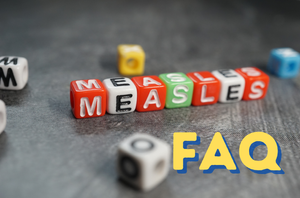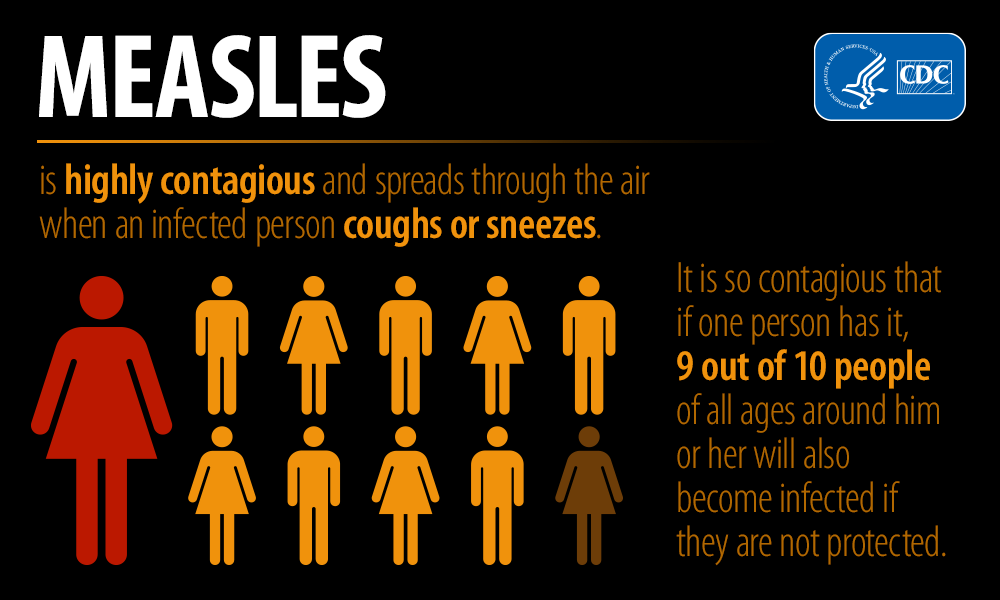Measles Frequently Asked Questions

As of March 7 2024, the Centers for Disease Control and Prevention (CDC) in the United States has reported a total of 45 measles cases across 17 states: Arizona, California, Florida, Georgia, Illinois, Indiana, Louisiana, Maryland, Michigan, Minnesota, Missouri, New Jersey, New York, Ohio, Pennsylvania, Virginia, and Washington.
That number nearly equals the total of 58 cases documented in the United States in all of 2023.
While the numbers may appear small, it’s important to note that measles is an extremely dangerous virus. There is, however, a vaccine that has been proven safe and effective over 60 years. Two doses are about 97% effective at preventing measles; one dose is about 93% effective.
While healthcare experts have stressed that there is no need for alarm, it is important for you and your family to be updated on the latest news regarding measles, and what you can do to keep yourself and your loved ones safe from this dreaded disease.
To offer you answers to all of your measles related questions, Tayo has prepared a list of Frequently Asked Questions.
What is measles and what are its symptoms?
Measles is one of the most highly contagious air-borne diseases and is amongst the global leading causes of death in children, despite the existence of a highly effective vaccine.
Measles infects the respiratory tract and then spreads throughout the body. Measles infection causes a rash to appear, alongside high fevers, diarrhea, coughing, runny nose, eye and ear infections.
How does measles spread?
Measles is a highly contagious virus that lives in the nose and throat mucus of an infected person. It can spread to others through coughing and sneezing.Droplets from this respiratory virus can land on someone else’s nose or on surfaces which can then infect others. If other people breathe the contaminated air or touch the infected surface, then touch their eyes, noses, or mouths, they can become infected.
What makes measles so dangerous?
Measles is a serious respiratory illness that is highly contagious. In severe cases, measles causes children’s brains to swell, leading to seizures, deafness, cognitive disability, and possibly death. Here are some statistics that convey the seriousness of measles.
- About 1 in every 20 children with measles also contracts pneumonia. One in five children who contract measles will be hospitalized.
- One to three children out of 1000 who contract measles will die.
Measles can even weaken the immune system, lasting weeks to years. A weakened immune system increases the risk of infection due to secondary bacterial and other infections.

Is it just children who are at risk?
It’s not just children who are at risk. Measles increases the risk of miscarriage in pregnant women and can cause stillbirth, premature labor, and low-birth weight infants. Those with weakened immune systems are more susceptible to developing serious complications. And anyone who has no prior measles exposure can get infected.
Can an infected person spread measles to others?
Yes. Someone who is infected with measles can spread the disease to other people before noticing any symptoms, especially in the four days before and after the rash develops. Measles is so contagious that if one person has it, 9 out of 10 people of all ages close to them and who are not immune will also become infected if they are not protected.
How soon do symptoms appear?
Symptoms usually appear 10 to 12 days after breathing in the virus; symptoms may start as early as seven days or as late as 21 days after exposure.
Can a person get measles more than once?
No. Infection makes a person immune for the rest of their life; that means they cannot get it again.
Is there a vaccine to prevent measles?
Yes and it has been proven very effective.
When should a person get a measles vaccine?
The measles vaccine is given on or after a child’s first birthday. It is combined with mumps and rubella vaccines into one vaccine called MMR (measles, mumps and rubella). A second dose of MMR vaccine is recommended before children enter school at 4 to 6 years of age. Anyone who has received two doses of a measles vaccine is considered immune and is unlikely to get measles.
Is the MMR (measles, mumps and rubella) vaccine effective?
The MMR vaccine is very safe and effective. Two doses of the MMR vaccine are about 97 percent effective at preventing measles; one dose is about 93 percent effective.
How long has the MMR vaccine been administered and tested?
The measles vaccine has been in use for about 60 years. Decades of clinical trial data and monitoring tens of millions of vaccinated people have continued to prove the vaccine is safe and effective.

Do all US states have measles vaccine requirements? Yes, currently all 50 states require children who attend school or child care to have two MMR vaccines.
Is it possible to get an exemption from the measles vaccine?
In some cases, a vaccination exemption can be given. In these cases, children would not have to get the required vaccines before getting an immigrant visa. This exemption can be granted only if parents sign an agreement that they are aware of the vaccines required.
What are the chances of contracting measles if you are unvaccinated?CDC data show that unvaccinated people have a very high likelihood, about 90% risk, that they will contract measles if exposed.
What is the treatment for measles?
There is no specific medicine to treat the measles virus, but there are medicines that can treat some of the symptoms, such as medication to reduce high fever.
What should you do if you become infected with measles and are not vaccinated?
- Contact a healthcare provider immediately and alert them that you believe you were exposed to measles. If you don’t have a regular primary care physician or insurance, contact your local public health department. Many local public health departments have vaccine clinics that you can visit.
- Ask them about receiving an MMR vaccine and discuss treatment options. According to the CDC, if you get MMR vaccine within 72 hours of initially being exposed to measles, you may get some protection against the disease, or have milder illness.
- You should isolate for 21 days after your exposure.
- You should wear a mask and disinfect surfaces when near others to avoid the spread of germs in the air and on common household items.
What should you do if you become sick with measles but are vaccinated?
This is an extremely rare occurrence but if it does happen you should;
- Contact a healthcare provider immediately and alert them that you believe you were exposed to measles.
- Discuss your vaccine history with them as part of determining possible treatment options.
- You should quarantine to limit contact with others. You may be advised to stay home for four days if you develop the measles rash.
- You should wear a mask and disinfect surfaces when near others to avoid the spread of germs in the air and on common household items.
I thought measles was eradicated in the United States? Why has it made a comeback?
Yes, by 2000, the CDC declared measles eradicated in the United States(absence of continuous disease transmission for greater than 12 months). There have been sporadic outbreaks since then, most notably in 2019 when 1274 people became infected.
The CDC said there are several reasons why measles has made a comeback. There has been an increase in the number of travelers who get measles abroad and bring it into the U.S. Also, many Americans fell behind in their take up of vaccines in general during the pandemic. Furthermore, there has been increasing vaccine skepticism among the population. And finally, there has been a notable rise in people asking for vaccine exemptions due to religious or other reasons.
I am planning on traveling internationally with my family. What should I do?
Measles cases are on the rise globally. The best way to protect yourself and your loved ones from measles is by getting vaccinated. You should plan to be fully vaccinated at least 2 weeks before you depart. If your trip is less than 2 weeks away and you’re not protected against measles, you should still get a dose of the measles-mumps-rubella (MMR) vaccine. The MMR vaccine protects against all 3 diseases.
Infants under 12 months old who are traveling:
- Get a measles vaccine at 6 through 11 months.
- Follow the recommended schedule and get another dose at 12 through 15 months and a final dose at 4 through 6 years.
Children over 12 months old up until 12 years old:
- Get first dose immediately.
- Get second dose 28 days after first dose.
Teens and adults with no evidence of immunity:
- Get first dose immediately.
- Get second dose 28 days after first dose
*This article was prepared with information provided by the CDC, the World Health Organization, and other trusted health care and medical professionals.
For more information on measles please visit;
The Center For Disease Control and Prevention(CDC)
*Here at Tayo we aim to offer the latest and best information regarding important public health matters. Any guidelines and suggestions listed here are based upon the recommendations of the CDC and other health care professionals. However, this advice may not suit each individual circumstance and is just meant as general guidelines. We encourage you to consult with your healthcare provider to get the answers that best suit your individual needs.


